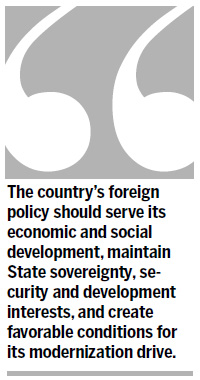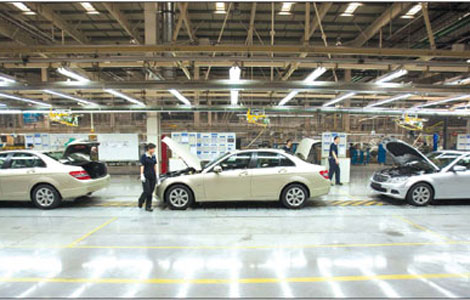Op-Ed Contributors
Harmonious diplomacy
Updated: 2011-03-09 08:00
By Chen Xiangyang (China Daily)

Nation should increase constructive dialogue and strategic cooperation with foreign partners to facilitate modernization
The next five years will be a "period of important strategic opportunities", although the situation in 2011, the starting year of the country's 12th Five-Year Plan period (2011-2015), remains extremely complicated, Premier Wen Jiabao said in his Government Work Report delivered to the ongoing Fourth Session of the 11th National People's Congress.
As Wen's report highlights, the decades-old international order is expected to undergo some profound adjustments in the post-crisis era, which will cause both opportunities and challenges for the peaceful rise of China.
"We will continue to hold high the banner of peace, development and cooperation," Wen said, stressing that China would seek to "create a more favorable external environment and more beneficial external conditions for China's modernization". He also said that China will continue to embrace an open strategy of mutual benefit and persist in its efforts to build a harmonious world with lasting peace and common prosperity.
China should firmly grasp these emerging strategic opportunities and steadily push forward its peaceful development strategy in a bid to create a more favorable external environment for the smooth implementation of its 12th Five-Year Plan for national economic and social development.
The country's foreign policy should serve its economic and social development, maintain State sovereignty, security and development interests, and create favorable conditions for its modernization drive.
To develop advantageous diplomacy, China should continue to acknowledge its status as a developing nation and only undertake international responsibilities commensurate with its national strength. It should adopt a differentiated diplomatic stance toward different issues based on its own priorities, and on issues that might compromise its core interests it should remain as steadfast and unflinching as it has in the past.
In his report, Wen stressed China's plan to maintain and develop healthy and stable relations with major powers and push forward dialogue and consultations with them. Undoubtedly, Sino-US relations still remain at the top of China's diplomatic agenda. To further advance the relationship, China and the US should take active measures to enhance mutual trust and reduce mistrust, expand areas of mutual cooperation and effectively manage their competition in a bid to build a harmonious bilateral relationship and promote common progress.
Given that neighboring countries have always been of strategic and geopolitical significance to its development, China should vigorously develop good relations with these countries. The country should enrich its friendly diplomacy with neighboring countries by strengthening economic cooperation and advancing security dialogues to promote the development of ties in an all-round way.
The country should also try to strengthen crisis management in its relations with neighboring countries in order to prevent tensions and conflicts escalating out of control. At the same time, it should also try to cement solidarity with neighboring countries and consolidate peace and stability in the region in a bid to prevent relations from being distorted or manipulated by ill-intentioned forces.
In addition to effective measures to deal with the crisis on the Korean Peninsula and disputes in the East and South China seas, China should also be prepared for the eastward shift of the US' strategic focus and Washington's return to East Asia.
As a developing nation, China should develop its ties with other developing countries, including BRICS members, and strengthen cooperation and coordination with them. And with the build-up of its economic power and its increasing economic activities in overseas regions, China should take diplomatic measures to facilitate its "go global" strategy.
At the same time, it should push forward its public diplomacy to increase understanding of its own development strategy among other countries and create a good international image. More cultural exchanges should be conducted with the outside world to expand China's cultural influence in the international community.
China will more actively participate in the G20 mechanism and other multilateral platforms to push forward reforms of the international financial system and the establishment of a more equitable and reasonable new international order, and China will continue to use multilateral diplomacy to play a constructive role in the settlement of some global and regional hot issues.
As Premier Wen highlighted in his Government Work Report, the Chinese government and people are willing to "make new contributions to humanity's lofty causes of peace and development".
The author is an associate research fellow with the Institute of World Political Studies under the China Institutes of Contemporary International Relations.
(China Daily 03/09/2011 page9)
E-paper

Factory fever
Despite auto manufacturing bubble scare, car giants gear up expansion of factories.
Dressed for success
Fabric of change
High spirits
Specials

Earthquake Hits Japan
A massive 8.8 magnitude quake hit the northeast coast of Japan on March 11,2011.

NPC & CPPCC sessions
Lawmakers and political advisers gather in Beijing to discuss major issues.

Slide: Japan quake
Devastating earthquake and tsunami left millions without water, electricity, homes or heat.
